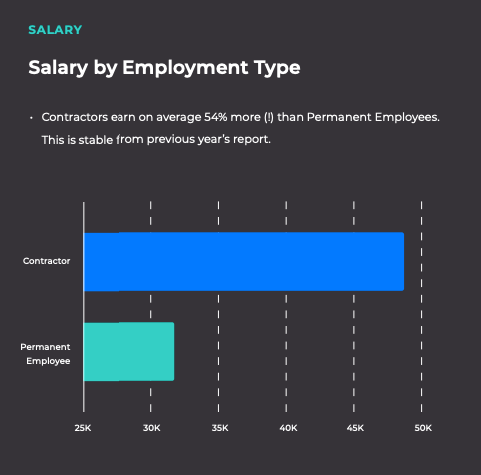If we were asked to illustrate the words “work” or “workplace”, most of us might imagine a corporate setting or a desk with a computer on top, coworkers all around and, of course, a boss to whom we have to answer.
But what if, to some extent, we could be our own bosses? There would be more responsibility, sure, but also more flexibility and maybe, just maybe, the feeling of really owning our own lives. Nothing says “stick it to the man” more than forging our own paths, or something like that.
But is it really worth it?
Well, we’ve put together our Tech Careers Report 2021 (free for you to download!) filled with tech-related data (salaries, jobs and roles, demographics,… basically all the tea) and, according to our findings, working as a contractor is becoming more common and has several benefits. Stay tuned:
1 — It Pays Better
Perhaps a lot of people never saw this one coming, but numbers don’t lie.
The average gross annual salary for tech professionals in Portugal working as a permanent employee is 32.5k€, and 48k€ for contractors.
Let’s break this down:
For starters, most contractors are senior professionals (6+ years of experience), which in itself usually means that those people are, or should be, earning more.
On top of that, the majority of contractors work for companies outside of Portugal, which definitely helps to bump the number even higher.
Working for an international company translates into 36% more income than working for a company based in Portugal, which is probably why 22% of the tech force is now embarking on this adventure — more than 50% of which is composed of contractors.
In a nutshell, contractors end up earning on average 54% more than permanent employees. That’s a big difference.

Landing.Jobs’ Tech Careers Report 2021 PT
Working as a contractor also brings a higher sense of fair salary treatment, which makes sense since you’ll need to systematically negotiate your wage while learning the hard way when you undervalue yourself. This might also help getting the annual gross salary a bit higher, since negotiating while a freelancer directly impacts your monthly revenue.
2 — Freedom and Flexibility become commonplace
This might be what most people working as contractors look for: freedom to choose which clients and projects they want, flexibility around their schedule and location, ownership of their own lives.
This is not to say that people working as permanent employees don’t have ownership; we all have different personalities that thrive in different settings but choosing to take full charge of your profession forces you to live a custom-made life.
This means that you’ll have the freedom to choose which clients to work for and which projects to work on, but also the responsibility of finding those clients and those projects (quick side note info: the average duration of a project is between 6 to 12 months, which is perfect if you’re the type of person who gets easily bored and needs new challenges to survive).
Having this flexibility will also mean having more control over your schedule, which ends up leaving more room for you to organize it in a way that pleases you [more than other people].
Because there’s a big probability you’ll be working remotely, another window for choice appears: work from where? Maybe you’ll choose a coffee house, your couch, or maybe Bali — who knows!
3 — Opportunities to Work for International Companies
One of the biggest benefits of working as a contractor is the opportunity to take a deep dive into jobs outside of your home country, most times without having to worry about relocation.
If you live in a country where the living cost isn’t that high but you’re doing projects for companies based in countries where the pay is higher… well, you should be living fine.
It also comes in handy if your niche isn’t really booming where you live, but it’s off the charts somewhere else. Working as a contractor is like working as a mercenary, navigating the sea of clients and projects and checking out where you can get the better challenge and the better pay.
While exporting your work, you’ll also be learning a lot more; shifting from projects, clients, and countries with some regularity inevitably brings valuable lessons — not only in a technical sense, but also a sort of business street smarts.
I’m interested — but how do I transition?
Before stressing out and start thinking it’s impossible to find clients, let’s keep in mind that shifting from permanent employee to full-time contractor is a learning curve.
A lot of people transition softly, maintaining their day job and doing side gigs here and there all the while building a network and getting referred by clients. When they do fully transition, there’s already a solid know-how about this type of work and a domino of clients.
It’s a good idea to go slow, especially if you’re just testing the waters and checking out if this type of work matches your personality. Not everyone thrives as a freelancer; as stated before, some people prefer to work for someone under a contract and that’s also ok.
Food for thought
There are some myths going about contractor work that simply don’t match reality, and hopefully today we’ve debunked a few of them.
Working as a freelancer means that you’re going to have more ownership of your professional life, for good and bad. You’ll probably need to save up more (which shouldn’t be that hard since you’d be earning more, wink wink) and definitely be more in touch with taxes (eeek), but on the other hand you get to choose which projects you’re going to work on, how you manage your day, where and how you’re working.
This way of living will also keep you on your toes, since you’ll need to be not only on top of your skill-game to be able to tackle different projects, but also keeping your soft skills in check — communication is key!
To sum it up, we can say there’s definitely a different control over your life. Even if you’re working on a particularly difficult project at least you chose to work on it as opposed to having to do it because someone told you so.
As with most things in life, it’s a game of pros and cons which needs some thinking about what might work best for you. And, if you started to feel a curiosity bug crawling over you while reading this, there’s nothing like trying it out — head over to our website and check out the contractor listings, something might catch your eye!






0 Comments